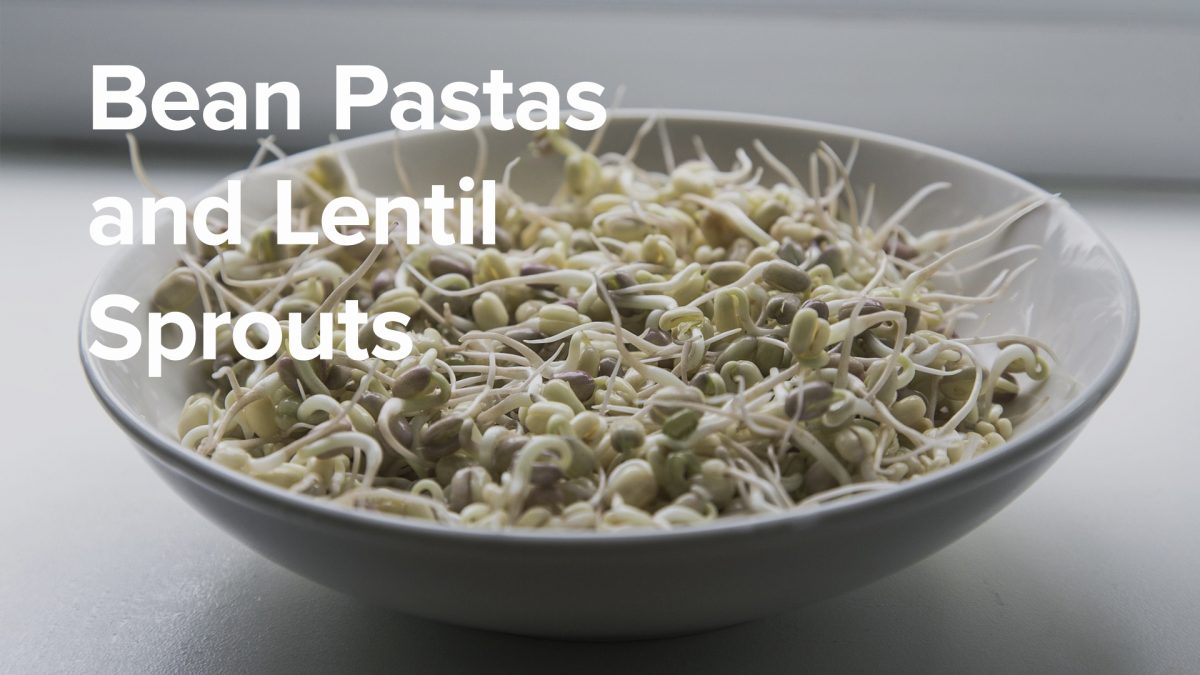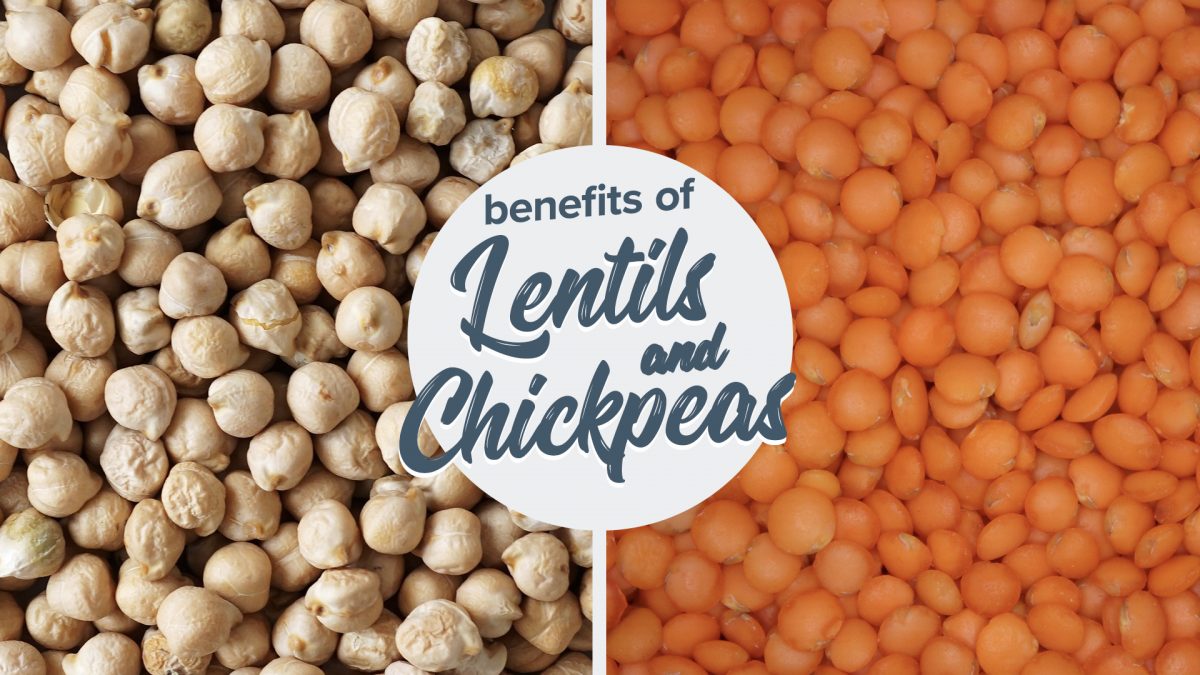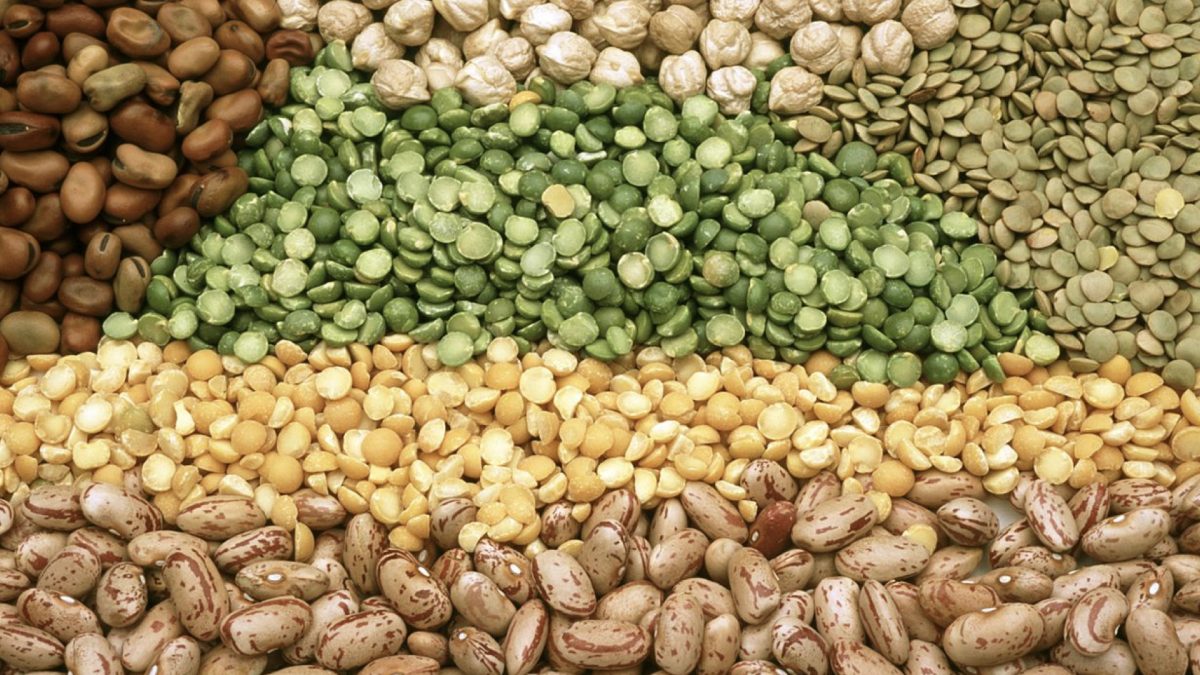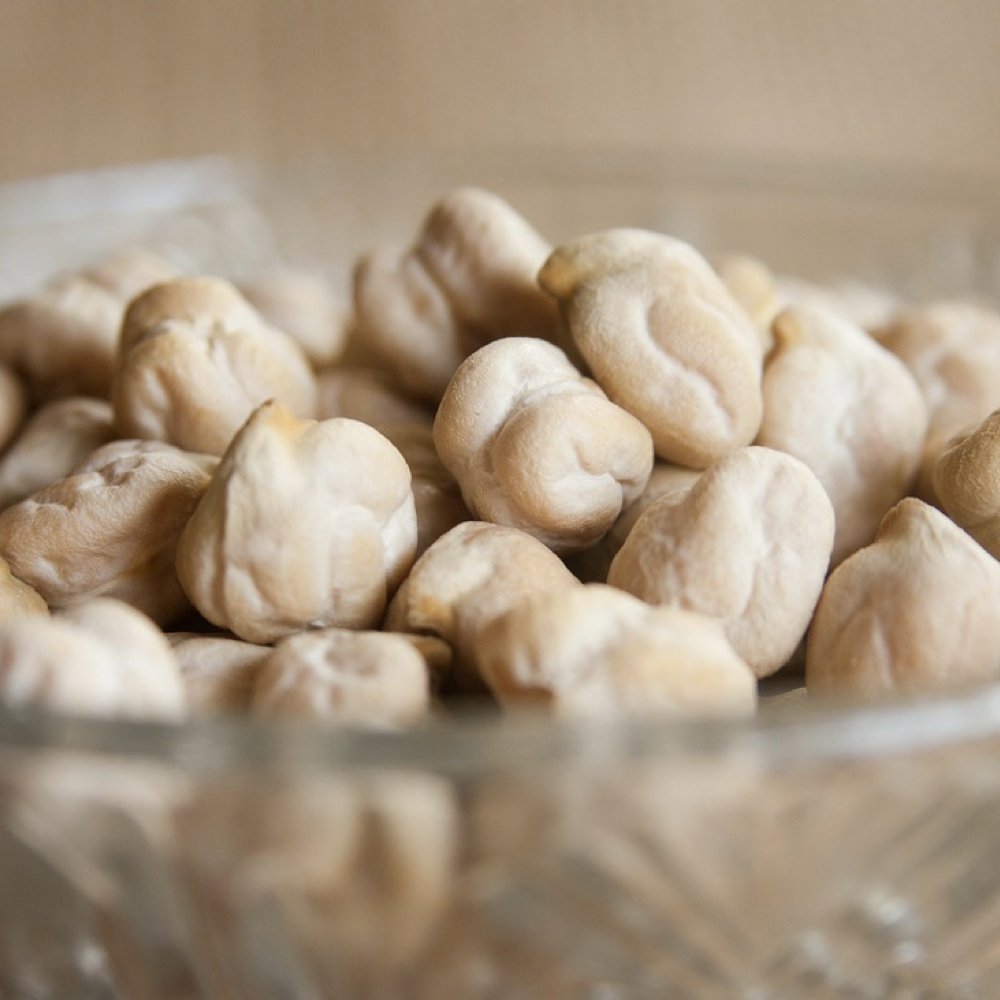
Chickpeas
Chickpeas, also known as garbanzo beans, and other legumes straddle both protein and vegetable groups. They’re loaded with protein, iron, and zinc, as you might expect from other protein sources like meat, but legumes also contain nutrients that are concentrated in the vegetable kingdom, including fiber, folate, and potassium. You get the best of both worlds with chickpeas, all the while enjoying a food that is naturally low in saturated fat and sodium and free of cholesterol.
The most comprehensive analysis of diet and cancer ever performed was published by the American Institute for Cancer Research. Sifting through some half a million studies, nine independent research teams from around the globe created a landmark scientific consensus report reviewed by 21 of the top cancer researchers in the world. One of their summary cancer-prevention recommendations is to eat whole grains and/or legumes—beans, split peas, lentils, or chickpeas—with every meal. Not every week or every day. Every meal.
Legume consumption is associated with a slimmer waist and lower blood pressure, and randomized trials have shown it may match or beat out calorie cutting for slimming tummy fat as well as improving the regulation of blood sugar, insulin levels, and cholesterol. Beans are packed with fiber, folate, and phytates, which may help reduce the risk of stroke, depression, and colon cancer.
In my Daily Dozen, I recommend at least three daily servings of beans a day, which comprise all the different kinds of beans, including soybeans, split peas, lentils, and chickpeas. A serving is defined as a quarter cup of hummus or bean dip; a half cup of cooked beans, split peas, lentils, tofu, or tempeh; or a full cup of fresh peas or sprouted lentils.
For substantiation of any statements of fact from the peer-reviewed medical literature, please see the associated videos below.
Image Credit: Pixabay. This image has been modified.
Popular Videos for Chickpeas


Benefits of Lentils and Chickpeas
Lentils and chickpeas, also known as garbanzo beans, are put to the test.
Benefits of Beans for Peripheral Vascular Disease
Do legumes—beans, chickpeas, split peas, and lentils—work only to prevent disease, or can they help...All Videos for Chickpeas
-

Healthy, Easy Recipes: Black Bean Stew, Kale Salad, and Molasses Cookies
Recipes from my new How Not to Age cookbook
-

Preventing Gestational Diabetes During Pregnancy with Diet
Eating well-balanced plant-based diets during pregnancy can reduce risks of gestational diabetes and hypertensive disorders like preeclampsia.
-

The Highest Antioxidant: Apple, Bean, Berry, Lentil, or Nut?
The best apple, bean, berry, lentil, and nut are the ones you’ll eat the most of; but if you don’t have a strong preference, which has the highest antioxidant power?
-

3 Healthy, Easy Recipes: Appetizer, Pasta, and Dessert
Celebrate the season with recipes from my cookbooks.
-

Greens, Green Tea, and Nuts Put to the Test for Telomeres
Not all plant foods are linked to less cellular aging based on telomere attrition, and not all animal foods are linked to more.
-

Strategies to Eat Less Meat
What is the most effective way to help people reduce their meat consumption?
-

Is Oatmeal Good for People with Diabetes?
Before there was insulin, there was the “oatmeal cure.”
-

The Impacts of Plant-Based Diets on Breast Cancer and Prostate Cancer
Why do people who eat more plants get less breast and prostate cancer?
-

The Best Diet for Fibromyalgia and Other Chronic Pain Relief
Anti-inflammatory diets can be effective in alleviating chronic pain syndromes.
-

The Harms Associated with Eating More Southern-Style Food
Diet appears to mediate the majority of the racial health gap.
-

Diet and Lifestyle for Cancer Prevention and Survival
What kind of diet should cancer patients eat?
-

Low-Protein Diets for Parkinson’s Disease
How might we maximize the therapeutic efficiency of levodopa?
-

How Much Does Meat Affect Longevity?
If you care about your health so much that it would be unthinkable to light up a cigarette before and after lunch, maybe you should order a bean burrito instead of a meaty one.
-

Are the Health Benefits of Nuts Limited to Those Eating Bad Diets?
Do nut eaters live longer simply because they swap in protein from plants in place of animal protein?
-

Blocking the Cancer Metastasis Enzyme MMP-9 with Beans and Chickpeas
Which legumes are best at inhibiting the matrix metalloproteinase enzymes that allow cancer to become invasive?
-

IARC: Processed Meat Like Bacon Causes Cancer
How did the meat industry, government, and cancer organizations respond to the confirmation that processed meat, like bacon, ham, hot dogs, and lunch meat, causes cancer?
-

How to Boost FGF21 with Diet for Longevity
Fasting and exercise can boost the longevity hormone FGF21, but what can we eat—or avoid eating—to get similar effects?
-

Glycemic Index of Potatoes: Why You Should Chill and Reheat Them
If you eat potatoes when they’re cold, as in potato salad, or chilled and reheated, you can get a nearly 40 percent lower glycemic impact.
-

Plant-Based Eating Score Put to the Test
How can you get a perfect diet score?
-

The Best Diet for Crohn’s Disease Treatment
Switching to a plant-based diet has been shown to achieve far better outcomes than those reported on conventional treatments in both active and quiescent stages in both Crohn’s disease and ulcerative colitis.
-

The Best Diet for Fatty Liver Disease Treatment
What are the three sources of the liver fat in fatty liver disease and how do you get rid of it?
-

The Benefits of Millet for Diabetes
What were the remarkable results of a crossover study randomizing hundreds of people with diabetes to one and a third cup of millet every day?
-

Plant-Based Meat Substitutes Put to the Test
What are the effects of plant-based meats on premature puberty, childhood obesity, and hip fracture risk?
-

Which Foods Have the Lowest Carbon Footprint?
How much greenhouse gas does the production of different foods cause measured in miles driven or lightbulb hour equivalents?
-

Win-Win Dietary Solutions to the Climate Crisis
The EAT-Lancet Commission lays out the best diet for human and planetary health.
-

Type 1 Diabetes Treatment: A Plant-Based Diet
Is it possible to reverse type 1 diabetes if caught early enough?
-

The Immune System and COVID-19 Treatment
Are there immune-boosting foods we should be eating?
-

What Are the Best Foods?
A review of reviews on the health effects of animal foods versus plant foods.
-

Fasting to Naturally Reverse High Blood Pressure
A whole food plant-based diet can be used to help lock in the benefits of fasting to kickstart the reversal of high blood pressure.
-

Evidence-Based Weight Loss – Live Presentation
In this live presentation, Dr. Greger offers a sneak peek into his book How Not to Diet.
-

Is Keto an Effective Cancer-Fighting Diet?
The clinical use of ketogenic diets for epilepsy and cancer: what does the science say?
-

The Best Diet for Diabetes
The case for using a plant-based diet to reduce the burden of diabetes has never been stronger.
-

Dairy and Cancer
How do we explain the increased risk of prostate cancer but the decreased risk of colon cancer associated with dairy consumption?
-

How to Treat Periodontitis with Diet
Plant-based diets are put to the test in the treatment of periodontal disease.
-

Is Fiber an Effective Anti-Inflammatory?
Most Americans get less than half the recommended minimum fiber intake a day and the benefits of fiber go way beyond bowel regularity.
-

Do Lutein Supplements Help with Brain Function?
Avocados, greens, and lutein and zeaxanthin supplements are put to the test for improving cognitive function.
-

Benefits of a Macrobiotic Diet for Diabetes
What happens when you add massive amounts of carbs to the daily diet of type 2 diabetics in the form of whole grains?
-

Bean Pastas and Lentil Sprouts
Do the benefits of beans, and lentils, and chickpeas remain when they’re powdered? Also, how to use temperature stress to boost sprout nutrition.
-

Benefits of Lentils and Chickpeas
Lentils and chickpeas, also known as garbanzo beans, are put to the test.
-

Benefits of Beans for Peripheral Vascular Disease
Do legumes—beans, chickpeas, split peas, and lentils—work only to prevent disease, or can they help treat and reverse it as well?
